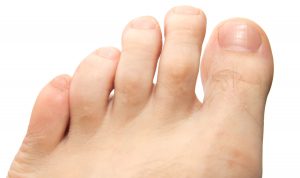Medically Reviewed by Dr. Rachel N. Verville
July 31, 2019

Warts can be quite an unpleasant experience for anyone. It’s not just their unsightly appearance but their physical discomfort, which can be particularly bothersome in sensitive areas such as the feet. Recurrent plantar warts can heighten frustration levels, further adding to the woe.
If you have a plantar wart, we recommend seeking evaluation, diagnosis, and treatment from a qualified podiatrist. By understanding the underlying causes of plantar warts and their tendency to recur, you can take preventive measures to stop them from resurfacing.
What Are Plantar Warts?
Plantar warts are small growths that appear on the feet, most often on the heel or the ball of the foot. These warts often grow inward and are covered with a thick, hard layer of skin.
Viruses are responsible for the development of all warts, and plantar warts, in particular, are caused by HPV. This virus typically enters your body through small cuts or scrapes on your feet. For this reason, plantar warts are most common among people who frequently walk barefoot across locker rooms or other highly trafficked public areas. Plantar warts are also more common among kids and teens and those with weaker immune systems.
While plantar warts do not usually pose a serious health concern, they can be aggressive and frustrating. Sometimes they go away on their own, but when they don’t, seeking treatment from a skilled foot doctor is the best course of action.
How To Diagnose Plantar Warts?
How do you know if you are truly dealing with plantar warts? Be on the lookout for the following symptoms:
- A growth on the foot that is different from your foot’s normal lines and ridges.
- A callus over a spot on the skin of the foot where the wart has grown inward.
- Black pinpoints that are actually small, clotted vessels, commonly called wart seeds.
- A small, fleshy, rough, grainy growth on the bottom of your foot.
- Pain or tenderness when putting pressure on the growth.
Why Do Plantar Warts Return?
While treatments are available to resolve plantar warts, these treatments do not guarantee a cure. Plantar warts have a notorious tendency to resurface even after they have seemingly gone away, indicating that follow-up treatments are essential for the effective resolution of the problem.
If your plantar warts return, it means that HPV is still present in your body, but it is no cause for alarm. The type of HPV that leads to plantar warts is mild and causes few problems. However, you should avoid scratching your plantar warts, as their blood can cause new warts to appear in the area it touches. You can also spread plantar warts to other body parts by touching the wart and then touching your skin in another area. As such, washing your hands after treating your plantar warts is imperative.
Seek Treatment for Plantar Warts
Rather than be frustrated by plantar warts, seek prompt diagnosis and treatment from a qualified podiatrist like Dr. Verville in the Frisco and Dallas Metro Area. Learn more about plantar warts from RNV Podiatry.




